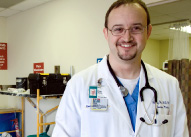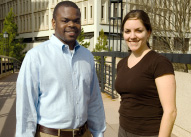

| Spring 2008 | |||||||||
| Current Issue | |||||||||
| A Family Affair A Global Solution for Diabetes Ecology and Public Health Building Public Health Capacity in India 'Big Picture' Thinking A Community of Scholars From the Dean In Brief Alumni News |
|||||||||
| Past Issues Other Publications Contact Us Make a Gift RSPH home |
|||||||||
|
|||||||||
Through the MD/MPH program, students gain a society-wide perspective
By Martha Nolan McKenzie
Milligan, Lutz, and Thomas are fourth-year medical students in Emory's dual-degree MD/MPH program. A collaboration of the RSPH and the School of Medicine, the program trains a different kind of physician—one with clinical expertise combined with a society-wide perspective on public health. To date, the 12-year-old program has graduated 56 students, and 28 more are enrolled as MPH or fourth-year medical students.
The joint MD/MPH program, in which students complete their MPH course work in 11 months between their third and fourth years of medical school, attracts some of the best and the brightest. Many are Woodruff scholars or hold other distinctions.
"The students who come to Emory with the dual degree in mind tend to be some of our very best students in medical school," says Bill Eley, 83m, 90MPH, who oversees medical education and student affairs in the School of Medicine. "They are outstanding academically, but they are also involved in the community and increasingly well traveled outside the country. Many have done work in public health before they get here."
Consider Thomas. In the year between college and medical school, Thomas enrolled in AmeriCorps in Berkeley, where she worked with homeless youth, connecting them with medical and social services and helping start a free clinic to serve them. Since coming to Emory, Thomas served two years as president of Health Students Taking Action Together (Healthstat), a statewide coalition of health science students founded by Emory medical students in 2001. Healthstat engages in advocacy, education, and service in areas of health disparities, HIV/AIDS, and childhood obesity. Healthstat also coordinates the Grady is Vital Campaign, advocating to state and county government and the local business community to save Grady Memorial Hospital, Atlanta's financially strapped public hospital.
"I think it's great that the medical school recognizes how valuable the public health program is in attracting new applicants," says Thomas. "It's a huge selling point for a new generation of students who are interested in combining public health and advocacy with medicine."
In fact, the RSPH and medical school are so committed to offering public health studies to medical students that they provide significant scholarship funds for the MPH year. One example is the Thomas F. Sellers Jr., MD, Scholarship, provided by the RSPH and named for the physician who was instrumental in building Emory's community health program (and the precursor to the RSPH). The medical school and the RSPH supplement such funds with additional awards, which are divided equally among the students. Just recently, the School of Medicine doubled the amount of scholarship support it provides for MD/MPH students.
"We know an extra year of tuition is a big burden," says Eley. "These students are going into fields where they'll probably make less money than their counterparts who did the straight MD. We don't want the cost to stand in the way of pursuing their interests."
The tuition support was a deciding factor for Demetrius Woods, a fourth-year student and recipient of a Dean's Scholarship from the medical school and an Adopt-a-Scholar Award from the RSPH. "After my first year of med school, I did a public health research project on chronic disease prevention, and that got me interested in pursuing my MPH," says Woods, who intends to practice as an OB/GYN and research health disparities and access to care. "The help with that year's tuition was definitely a factor in my decision to get the dual degree."
Back to top

| ny | tiny font | ny |
| As an MD/MPH student, Jeremy Hess piloted his own curriculum in global environmental health. |
Students such as Woods are drawn to the dual-degree program by the unparalleled experiences it offers. During their public health year, students can choose from a variety of traditional and nontraditional degree concentrations. "We offer a number of concentrations beyond what is usual for a school of public health," says epidemiologist and infectious disease physician John McGowan, who coordinates the MD/MPH program at the RSPH. "Not only do we have the Hubert Department of Global Health, which is fairly unusual, but we offer degree concentrations in global environmental health and global epidemiology. Our students tend to be individualistic, so they appreciate the opportunity to pursue innovative pathways."
That's exactly what Jeremy Hess, 03M/MPH did. Having worked on AIDS prevention programs in the Philippines and Thailand, investigated a toxic waste accident in Cambodia, and studied the effectiveness of a food aid program to child-headed households in Rwanda—all before his year in the RSPH—Hess knew the degree he wanted to pursue—global environmental health. The fact that the school didn't formally offer that degree at the time didn't deter Hess or the RSPH faculty.
"They let me put together my own curriculum, and I sort of piloted that program," says Hess, who now teaches emergency medicine and global health at Emory and researches global climate change and human health. "The school formally launched that concentration the following year."
Emory also offers students unequalled research opportunities through its local partnerships with the CDC, The Carter Center, care, and the American Cancer Society. "The Carter Center, for example, offers opportunities to work in a disease eradication program that students can't find anywhere else," says McGowan. "These partnerships help us attract some of the finest practitioners in the field."
Elizabeth Lutz took advantage of the CDC partnership during the summer between her first and second years of medical school to see if public health was something she was truly interested in pursuing. "I was interested in the concept of public health, but I really didn't know what you would actually do in the field," she says.
At the CDC, Lutz worked in a division charged with infection surveillance. She collaborated with CDC epidemiologists to develop systems to track hospital-acquired infections. "That summer at the CDC solidified my interest in public health," she says. "After that, I knew I wanted to pursue the dual degree."
MD/MPH students also can take advantage of summer electives, including the global field experience (GFE) and the CDC elective rotation fellowship. Through the GFE, students apply what they've learned in the past year in real-world settings across the globe. Milligan and Lutz spent a summer in the Ukraine working with unicef. Milligan worked at a neurosurgical hospital in Kiev, gathering data on the prevalence of neural tube defects in newborns, while Lutz studied iron deficiency anemia in pregnant women at a clinic. The experience was eye opening.
"Everyone talks about how hard it is to do research internationally, but until you get over there, it's impossible to understand," says Lutz. "You're dealing with another language, foreign customs. The most valuable lesson I learned is that it's impossible to plan in this situation, so you have to give up some control and go with the flow."
The CDC elective rotation fellowship gives students a chance to see applied field epidemiology in action, both domestically and abroad. When possible, students can go out into the field and participate in a CDC investigation of a public health issue.
Back to top

| ny | tiny font | ny |
| During their year in the RSPH, Demetrius Woods gained a deeper appreciation for how hospitals operate, while Larissa Thomas learned from health experts in other countries. |
After completing their year of study in the RSPH, students return for their final year of medical school, forever changed by the experience. "The public health year gave me the opportunity to do research that will improve patient care in a nonclinical role," says Woods.
Toward the end of his public health year, Woods began to study a new practice model for OB/GYN called obstetric hospitalists. This model addresses the issue that is keeping more and more students from pursuing a specialty in OB/GYN—unpleasant work hours. Instead of one physician trying to manage both a private practice and hospital deliveries, obstetric hospitalists would work only in the hospital, on shifts much like emergency medicine physicians. The work hours of the hospitalists are predictable, and practicing OB/GYNs can focus on outpatient care without having to constantly leave their office.
"The public health year gave me a much better perspective on how hospitals run and how medicine is practiced outside the point of view of the clinician," says Woods. "I believe having a public health background will make me a better clinician and having a medical background will make me a better hospital administrator."
Thomas agrees. "During the public health year, you are exposed to a different type of thinking—more ‘big picture' thinking—and you interact with completely different kinds of people," she says. "I studied global epidemiology, and I met physicians and people from ministries of health in other countries. It was amazing to be able to sit down with them and hear their perspective. Then when you come back to medical school, you tend to see everything that happens in clinical encounters in terms of the bigger picture."
Current Issue | Past Issues | Contact Us | Make a Gift
Back to Top | RSPH home
© 2008. Emory University, All rights reserved.
Back to Top | RSPH home
© 2008. Emory University, All rights reserved.